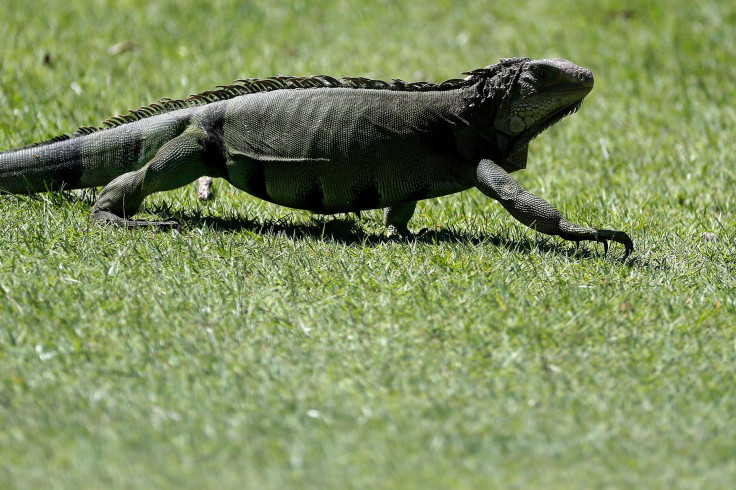Scientists Are Smashing In Iguana Heads To Combat Reptile Overpopulation

A team of researchers in Broward County, Florida, have begun bashing in the skulls of iguanas to control the reptile population that has inundated the area.
Two teams consisting of 15 researchers at the University of Florida use blunt objects to destroy the reptile's brain, believed to be the most humane option, the Sun-Sentinel reported Friday. The team has reportedly logged 249 iguanas.
"Most of what we’re doing is blunt force trauma," Jenny Ketterlin, a wildlife biologist told the paper. "Hitting their head very hard against a solid object," adding that the method may sound gruesome, buts its considered in line with the state’s anti-cruelty laws.
The scientists also rely upon a powerful projectile weapon called a captive bolt gun to combat the invasive iguanas. The bolts are shot into the reptile’s brain, instantly causing death.
The teams typically search for the creatures at night. Still, it isn't the most efficient method as some manage to escape.
"We are using flashlights to find them," Ketterlin said. "They are slow at first. If they’re in a tree and wake up, they’ll jump into the canal or jump onto the ground and run off."
Accurately striking the iguana is essential as more than one hit could constitute animal cruelty, resulting in fines up to $5,000 or prison, Ron Magill, an animal ambassador for Zoo Miami, told the paper.
"Unless you have an animal that you can have in your hand, [killing humanely] is very hard to do," Maghill said.
The iguana extermination is part of a $63,000 research project spearheaded by the Florida Fish and Wildlife Conservation Commission to best eradicate the reptiles, which have plagued resident’s yards and harmed wildlife.
"Iguanas are an invasive species in Florida and can be a nuisance to homeowners or impact native wildlife," wildlife agency spokeswoman Carli Segelson told the Sun-Sentinel. "Iguanas can feed on native plants and wildlife and dig into areas that may cause erosion."
The scientists transport the dead iguanas to a nearby lab where they are measured and weighted and then sent to a landfill. The team also has set traps in county parks with fruits and vegetables as bait. The three-month project is slated to run through May.
The iguana is a herbivorous lizard native to tropical areas such as Mexico, Central and South America, the Galápagos Islands and some of the Caribbean islands, according to Live Science. Male iguanas are considered territorial and can destroy landscape through burrowing habits.
© Copyright IBTimes 2024. All rights reserved.











